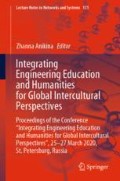Abstract
This article is devoted to the issues of developing general cultural competences of undergraduate students. Special attention is paid to the foreign-language communicative competence that determines the ability and commitment of Russian specialists to establish and develop professional communication in a foreign language. In order to develop the above-mentioned competence, the authors suggest implementing communicative training technology, which presupposes the creation of special conditions for intensive interpersonal interaction in a foreign language. The assignments of the communicative training include regional content that is connected to the field of nuclear energy and technical physics. The regional content itself reflects the comparison of functioning of nuclear power plants in Nizhny Novgorod region, Russia, and the province of Ontario, Canada. The concept of the regional content is studied at the micro-level and allows creating special communicative training tasks that are based on real professional communicative situations that are significant for the representatives of both regions. Nizhny Novgorod region, which is known to be a major research center of nuclear energy, is of great interest to specialists in this field around the world. Regional content communicative training presented in the article will prepare Nizhny Novgorod nuclear energy and technical physics undergraduate students for successful interaction with their foreign colleagues in the sphere of operation of nuclear power plants.
Access this chapter
Tax calculation will be finalised at checkout
Purchases are for personal use only
References
Marginson, S.: World higher education under conditions of national/global disequilibria. Centre for Global Higher Education, UCL Institute of Education, London (2018)
Shields, R.: The sustainability of international higher education: student mobility and global climate change. J. Clean. Prod. 217, 549–602 (2019)
Leonova, E.V.: Formirovanie obshchekul’turnyh kompetencij u studentov tekhnicheskogo vuza [Formation of general cultural competencies among students of a technical university]. High. Educ. Russ. 2, 124–131 (2010). (in Russian)
Fomina, N.N.: Gumanitarnoe obrazovanie v tekhnicheskom vuze: soderzhanie, tekhnologiya, kompetencii [Humanitarian education at technical university: content, technology, competencies]. Sci. Techn. J. Inf. Technol. Mech. Opt. 2, 153–160 (2007). (in Russian)
Almazova, N.I., Baranova, T.A., Halyapina, L.P.: Integrirovannoe obuchenie inostrannym yazykam i professional’nym disciplinam. Opyt rossijskih vuzov [Integrated teaching of foreign languages and professional disciplines, Experience of Russian Universities], 1st edn. Peter the Great St. Petersburg Polytechnic University, St. Petersburg (2018). (in Russian)
Halyapina, L.P., Popova, N.V., Kuznetsova, O.V.: Mezhdisciplinarnoe proektirovanie kak sredstvo realizacii integrirovannogo predmetno-yazykovogo obucheniya v vuze [Interdisciplinary design as a mean of implementing integrated subject-language education at university]. Sci. Tech. Statements St. Petersburg State Polytech. Univ. Hum. Soc. Sci. 8(3), 145–152 (2017). (in Russian)
Silberman, M.L.: 101 Ways to Make Training Active, 2nd edn. Pfeifer, London (2005)
Campbell, C.P.: Training course/program evaluation: principles and practices. J. Eur. Ind. Train. 22(8), 322–344 (1998)
Wood, D.: Theory, training and technology. Educ. Train. 37(2), 9–15 (1995)
Wood, D.: Theory, training and technology. Educ. Train. 37(1), 12–16 (1995)
Greene, J.O., Burleson, B.R.: Handbook of Communication and Social Interaction Skills. Mahwah, NJ (2003)
Knapp-Potthoff, A.: Interkulturelle Kommunikationsfahigkeitals Lernziel. Aspekteinterculturreller Kommunikationsfahigkeit 2, 181–205 (1997)
Shitikova, I.B., Pleshkova, A.V.: Obrashcheniye k regionalnim etnokulturnym traditsyjam kak vazhnejshemu komponentu naridnogo iskusstva [Appeal to regional ethnocultural traditions as the most important component of folk art (in the process of professional training of designers)]. In: Proceedings of the Conference “Actual Problems of the Development of Science and Modern Education”, pp. 548–550. Belgorod Press, Belgorod (2017). (in Russian)
Yermakova, Y.I.: Sredstva formirovaniya professional’noy kommunikativnoy competentsii s integrirovannym professional’nym komponentom [Means of forming professional communicative competence with an integrated professional component]. Eur. J. Soc. Sci. Educ. Res. 8, 300–306 (2017). (in Russian)
Oberemko, O.G., Glumova, E.P., Shimichev, A.S.: Developing foreign language regional competence of future foreign language teachers: modeling of the process. In: Advances in Intelligent Systems and Computing, vol. 907, pp. 195–209 (2019)
Larouzée, J.: Human error and defense in depth: from the “Clambake” to the “Swiss Cheese”. In: Resilience: A New Paradigm of Nuclear Safety, vol. 257–267 (2017)
Twilley, R.C.: Framatome ANP’s SWR1000 reactor design. Nucl. News 45(10), 36–40 (2002)
OECD Nuclear Energy Agency. https://oecd-nea.org/ndd/reports/2010/nea6861-comparing-risks.pdf. Accessed 20 Dec 2019
Lunin, G., Dragunov, Yu., Voznesenskiy, V.: The Russian advanced VVER reactor designs. Nucl. News 45(7), 28–36 (2002)
Lee, T.R., Harrison, K.: Assessing safety culture in nuclear power stations. Saf. Sci. 3, 61–97 (2000)
Dhillon, B.S.: Safety, Reliability, Human Factors and Human Error in Nuclear Power Plants, 1st edn. CRC Press, Florida (2017)
Bim, I.L.: Lichnostno-orientirovannyj podhod - osnovnaya strategiya obnovleniya shkoly [Personality-oriented approach - the main strategy for updating the school]. Inostrannye yazyki v shkole 2, 11–15 (2002). (in Russian)
Andreeva, G.M.: Social’naya psihologiya [Social psychology], 5th edn. Aspect press, Moscow (2001). (in Russian)
Author information
Authors and Affiliations
Corresponding author
Editor information
Editors and Affiliations
Rights and permissions
Copyright information
© 2020 Springer Nature Switzerland AG
About this paper
Cite this paper
Glumova, E., Tataurova, E., Mahdi, M.H. (2020). Development of General Cultural Competences of Higher Education Students on the Basis of Regional Content Communicative Training. In: Anikina, Z. (eds) Integrating Engineering Education and Humanities for Global Intercultural Perspectives. IEEHGIP 2022. Lecture Notes in Networks and Systems, vol 131. Springer, Cham. https://doi.org/10.1007/978-3-030-47415-7_36
Download citation
DOI: https://doi.org/10.1007/978-3-030-47415-7_36
Published:
Publisher Name: Springer, Cham
Print ISBN: 978-3-030-47414-0
Online ISBN: 978-3-030-47415-7
eBook Packages: Intelligent Technologies and RoboticsIntelligent Technologies and Robotics (R0)

